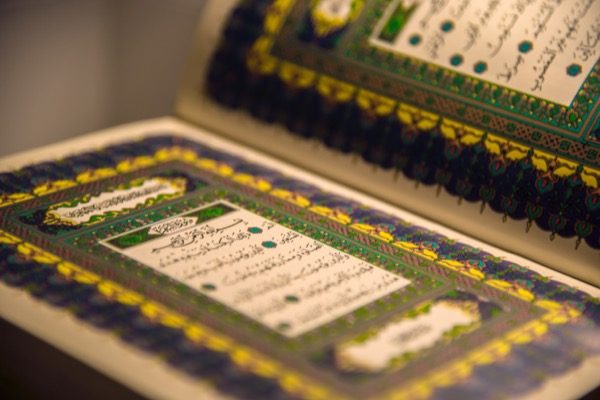
Chapter 1, Verse 1
The Review of Religions continues the serialisation of At-Tafsīr Ul Kabīr: The Grand Exegesis in English, written by Hazrat Mirza Bashiruddin Mahmud Ahmad(ra), the second head of the worldwide Ahmadiyya Muslim Community. This is one of the most insightful and in-depth commentaries of the Holy Qur’an ever written, brought to English readers for the first time.
Translated by Murtaza Ahmad
Exegesis of بِسْمِ اللَّهِ الرَّحْمَنِ الرَّحِيمِ
In the Holy Qur’an, every chapter, except al-Barā’ah [also known as Surah at-Taubah], begins with [the phrase] bismillāh. However, amongst the varying views about the chapter al-Barā’ah, the view which is generally accepted is that this chapter is not independent; rather, it is a continuation of Sūrah al-Anfāl. Hence, bismillāh has not been written separately at the beginning of this chapter. There is a saying reported by Ibn ‘Abbās (ra) in Abū Dāwūd [a collection of ahadith, oral traditions passed down from the Holy Prophet (sa)] that:
كَانَ النَّبِيُّ
صَلَّى اللَّهُ عَلَيْهِ وَسَلَّمَ لَا يَعْرِفُ فَصْلَ السُّورَةِ حَتَّى
تَنَزَّلَ عَلَيْهِ بِسْمِ اللَّهِ الرَّحْمَنِ الرَّحِيمِ
[i]
Which means that ‘whenever a chapter of the Qur’an was revealed after another, bismillāh was also revealed at the beginning of that sūrah, and the Holy Prophet (sa) would not declare any revelation to be of a new sūrah unless it began with bismillāh.’ Ḥākim has also narrated this hadith in Mustadrak.[ii] It is evident from this hadith that bismillāh was revealed at the beginning of every new chapter, and that it was understood that a sūrah ends only when a new sūrah begins with bismillāh. Therefore, since bismillāh was not revealed at the beginning of Sūrah al-Barā’ah, this chapter is certainly not an independent chapter,rather a part of Sūrah al-Anfāl.
It is also evident from this hadith that bismillāh, which comes at the beginning of every chapter, is divinely revealed and part of the Holy Qur’an, and not an addition to it. Some scholars have opined that bismillāh is not a part of any chapter except Sūrah al-Fātiḥah, and others have said that bismillāh is not a part of any sūrah. However, this notion is incorrect. First of all, the above hadith refutes this view. Secondly, there are many other hadith in which the Holy Prophet (sa) has categorically affirmed that bismillāh forms part of a sūrah.
For instance, with regards to it being a part of Sūrah al-Fātiḥah, Dāraquṭnī narrates on the authority of Abū Hurairah (ra) that the Holy Prophet (sa) stated:
إِذَا قَرَأْتُمُ الْحَمْدُ فَاقْرَؤُوا بِسْمِ اللهِ الرَّحْمَنِ الرَّحِيمِ، إِنَّهَا أُمُّ الْقُرْآنِ، وَأُمُّ الْكِتَابِ، وَالسَّبْعُ الْمَثَانِي، وَبِسْمِ اللهِ الرَّحْمَنِ الرَّحِيمِ إِحْدَى آيَاتِهَا[iii]
That is, ‘when you recite Sūrah al-Fātiḥah, then alsorecite bismillāh as Sūrah al-Fātiḥah is the Mother of the Qur’an, the Mother of the Book and the Oft-repeated Seven Verses and the verse bismillāh is from among its verses.’ Imam Bukhari has also narrated this hadith inhis book Tārīkh as marfū‘[iv]and also as mawqūf[v].[vi]
This hadith also indicates that bismillāh is a part of other chapters as the Holy Prophet (sa) has not only said that bismillāh is a part of Sūrah al-Fātiḥah, but he has also put forward the argument that because it is the Mother of the Book and the Mother of the Qur’an, so one must recite bismillāh with it. This argument can be valid only if this verse is taken to be a part of all sūrahs. It is argued that because bismillāh is a part of other sūrahs, it can be understood that it has to necessarily be part of Sūrah al-Fātiḥah, which is the Mother of the Book and the Mother of the Qur’an. Thus, prior to reciting it, this verse should be read.
Besides this, there are other arguments also. For example, Muslim [another collection of ahadith] relates on the authority of Anasra that once the Holy Prophet (sa) said:
أُنْزِلَتْ عَلَىَّ آنِفًا سُورَةٌ. فَقَرَأَ بسْمِ اللَّهِ الرَّحْمَنِ الرَّحِيمِ إِنَّا أَعْطَيْنَاكَ الْكَوْثَرَ[vii]
That is: ‘Just now a chapter has been revealed to me, which is, “In the name of Allah, the Most Gracious, the Ever Merciful. Surely We have given thee abundance of good.”’[viii] Thus the Holy Prophet (sa) has taken bismillāh to be a part of Sūrah al-Kawthar. Likewise, there are also similar hadith about other chapters.
An objection can be raised about this narration, viz., that the sūrah mentioned in it is a Makkan sūrah. Yet Anas (ra), who was of the Anṣār [the people who lived in Madinah][ix], was a child of eight or nine years old at the time of hijrah [the migration of the Holy Prophet (sa) to Madinah]. According to the wording of the hadith, the Holy Prophet (sa) said this immediately after the revelation of the sūrah. How then did Anas (sa) come to hear this? If there were no other arguments in support of this assertion, the objection in question would certainly render the hadith weak. However, in the presence of other arguments, such as the fact that sometimes the companions used to narrate hadith by hearing them from other companions, this objection does not carry much weight. It is an established practice in determining the authenticity of any hadith that when a companion attributes a narration to the Holy Prophet (sa), it is necessarily true. This is because there is no proof whatsoever that any of the companions ever uttered a falsehood. Thus, if Anasra attributed this hadith to the Holy Prophet (sa), he must have heard it from a companion who had migrated from Makkah. And when the chain of narrators reaches a companion, the authenticity of the hadith cannot be doubted.
Some people think that the Ḥanafis [the followers of Imam Abū Ḥanifah’s school of Islamic jurisprudence] believe that bismillāh is not part of the Holy Qur’an. This view is incorrect as this is not the belief of Imam Abū Ḥanīfah (ra). Rather, his view is that bismillāh is an independent verse which is not part of any sūrah. Imam Abū Bakr al-Razī, who was a leading Hanafi scholar, writes in his book, Aḥkāmul-Qur’ān:
وَلَمَّا ثَبَتَ أَنَّهَا لَيْسَتْ مِنْ أَوَائِلِ السُّوَرِ، وَإِنْ كَانَتْ آيَةً فِي مَوْضِعِهَا عَلَى وَجْهِ الْفَصْلِ بَيْنَ السُّورَتَيْنِ أُمِرْنَا بِالِابْتِدَاءِ بِهَا تَبَرُّكًا[x]
‘Since it has been proved that this verse is not part of a chapter, even though it has been revealed as a verse in its own right to indicate the separation of one chapter from the other, we have been commanded to commence our prayer with this verse as a blessing.’
Thus, it is only the uninformed who hold the view that the Ḥanafis do not consider bismillāh to be a part of the Qur’an. There is no doubt that they do not consider it to be a part of any sūrah; however, they do consider it to be a part of the Qur’an. Yet, in my opinion, this particular view [i.e. that bismillāh is not part of any sūrah] is incorrect. The truth is that bismillāh is a part of every sūrah. As I will subsequently detail there is much wisdom in placing it at the beginning of every sūrah.
Serialisation will continue in the next edition.
*NOTE: Some references were cited by Hazrat Mirza Bashiruddin Mahmud Ahmad (ra) in the original at-Tafsir-ul-Kabir –The Grand Exegesis. Those references have been appended by the words [Author] in brackets. In some instances, however, the translation team has provided the references from modern-day editions of those works. For references below where these newer references have been added, we have added an asterisk and put the reference in boldface type.
[i] Abū Dāwūd, Kitābuṣ-Ṣalāh, Bābu Man Jahara Bihā. [Author]
[ii]* Tafsīr al-Qurʾān al-ʿAẓīm, By Abū l-Fidā’ Ismāʿīl bin ‘Umar bin Kathīr, Beirut, Lebanon: Dār Ibn Ḥazm, 1420 AH (2000), Volume 1, p. 61. [Author]
[iii] Dāraquṭnī, Kitābus-Ṣalāh, Bābu Qirā’ati Bismillāhir-Raḥmānir-Raḥīmi Fīṣ-Ṣalāh. [Author]
[iv] That is, its chain of narrators reaches the Holy Prophet (sa). [Publishers]
[v] That is, its chain of narrators ends with a Companion of the Holy Prophet (sa) and does not extend to him. [Publishers]
[vi]* Fatḥul-Bayān fī Maqāṣid al-Qur’ān, By al-Qinnawjī al-Bukharī, Beirut, Lebanon: Dār-ul-Kutub-ul-‘Ilmiyyah, 1999, Volume 1, p. 31. [Author]
[vii] Saḥīḥu Muslim, Kitābuṣ-Ṣalāh, Bābu Ḥujjati Man Qālal-Basmalatu Āyatun Min Awwali Kulli Sūratin Siwā Barā’ah, Ḥadīth No. 400. [Author]
[viii] Sūrah al-Kawthar, 108:1-2. [Author]
[ix] The Anṣār [Helpers] is an Islamic term for the local inhabitants of Madinah who took the Holy Prophetsa and his companions into their homes when they emigrated from Makkah. [Publishers]
[x]* Aḥkāmul-Qurʾān, By Abū Bakr Aḥmad ibn ‘Alī al-Rāzī al-Jaṣṣāṣ, Beirut, Lebanon: Dār Iḥyā’ al-Turāth al-‘Arabī, 1984, Volume 1, p. 15. [Author]




Add Comment